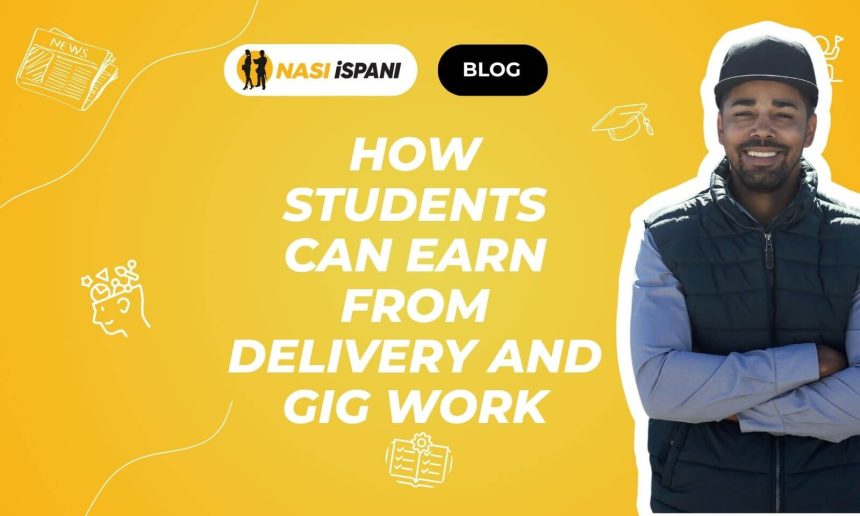Many South African students face the challenge of balancing studies with financial needs. Rising living costs, transport expenses, and tuition fees make part-time income a necessity. Fortunately, the growth of the gig economy and delivery platforms has opened new earning opportunities for students seeking flexible, low-barrier work.
This guide explores how students in South Africa can earn income through delivery and gig work, the platforms available, required skills, legal and safety considerations, and strategies to maximise income — all while staying focused on their studies.
Understanding the Gig Economy
The gig economy refers to flexible, short-term, or freelance jobs — often mediated through online platforms or mobile apps. Unlike traditional employment, gig work allows individuals to choose when and how much they work.
In South Africa, the gig economy has expanded rapidly, driven by the rise of digital platforms such as:
- Uber, Bolt, and inDriver for ride-hailing
- Uber Eats, Mr D, and Bolt Food for food delivery
- SweepSouth, TaskRabbit, and Airtasker for household and odd jobs
- Freelance platforms like Fiverr, Upwork, and PeoplePerHour for digital services
For students, these opportunities provide flexibility — allowing them to earn money around their class schedules.
Why Delivery and Gig Work are Ideal for Students
1. Flexible Hours
Students can choose their working hours, taking gigs during free time, weekends, or holidays.
2. Low Entry Requirements
Most platforms require minimal qualifications. For example, food delivery services mainly require a vehicle, a smartphone, and a valid ID.
3. Skill Development
Gig work teaches time management, communication, and customer service — all valuable in future careers.
4. Networking and Independence
Students often meet clients, business owners, and other freelancers, helping build confidence and real-world experience.
5. Potential for Scaling
Many start small and later turn gig work into full-time income or small businesses.
Delivery Jobs for Students in South Africa
Delivery work is one of the most accessible income streams for students, especially with the surge in e-commerce and food delivery demand.
1. Food Delivery Platforms
a. Uber Eats
Uber Eats partners with drivers and cyclists across South Africa. Students can deliver using scooters, bicycles, or cars. Earnings depend on distance, time, and demand.
Requirements:
- Be at least 19 years old
- Have a valid South African ID or work permit
- Own a vehicle (bike, scooter, or car)
- Valid driver’s licence or learner’s for scooters
- Smartphone with GPS and data
Earning Potential:
R2,000–R6,000 per month part-time depending on hours worked.
Sign-Up: https://www.ubereats.com/za
b. Mr D Food
Mr D operates in most cities and towns in South Africa. They partner with delivery drivers on a contractor basis.
Requirements:
- South African ID or passport
- Valid driver’s licence or learner’s
- Smartphone with data
- Delivery bag and branded gear (available during onboarding)
Earning Potential:
R25–R35 per delivery during normal hours, more during peak times.
Sign-Up: https://www.mrdfood.com/
c. Bolt Food
Bolt Food is expanding rapidly in Gauteng, Western Cape, and KwaZulu-Natal. The platform works similarly to Uber Eats.
Requirements:
- ID or work permit
- Vehicle (car, scooter, or bicycle)
- Smartphone with the Bolt Food Courier app
Sign-Up: https://food.bolt.eu/
2. Package Delivery and Courier Gigs
Some companies offer ad-hoc parcel or document delivery work suitable for students with reliable transport.
- Pargo Pickup Points: Students can partner as agents managing parcel pickups and drop-offs.
- Picup: Offers delivery gigs for online orders and corporate deliveries.
- CourierIt and The Courier Guy: Sometimes outsource deliveries to contract couriers.
Gig Work Beyond Deliveries
Not every student has access to a vehicle, and that’s where other gig opportunities come in.
1. Freelance and Remote Gigs
Digital gig platforms allow students to monetise skills in writing, design, tutoring, or marketing.
- Fiverr – Offer services like writing, logo design, or social media management.
- Upwork – Ideal for long-term freelance contracts in tech, admin, or research.
- TutorMe or TeachMe2 – Perfect for tutoring high school or first-year university students.
Earning Potential:
Anywhere from R150–R500 per hour depending on skill level and service.
2. Domestic and Odd Jobs
Platforms like SweepSouth and Airtasker connect users with people needing help around the house, including cleaning, gardening, moving, or small repairs.
These gigs are especially useful for students who prefer physical work or live in urban areas.
3. Promoter and Brand Ambassador Work
Many brands, especially in entertainment and tech, hire students as campus ambassadors. Duties include distributing flyers, managing social media promotions, and hosting activations.
Example Opportunities:
- Oppo SA Student Ambassadors
- Vodacom or MTN Campus Campaigns
- Student Village Promoter Jobs
4. Online Selling and Content Creation
Social media has created opportunities for entrepreneurial students to earn through digital sales and influence.
- Sell fashion, accessories, or handmade items on Instagram, Facebook Marketplace, or Yaga.
- Create TikTok or YouTube content — monetise via partnerships or sponsorships.
- Offer photography or editing services to peers and local businesses.
How to Register and Start
Step 1: Choose a Gig Type
Decide what suits your schedule and skills — delivery, freelancing, tutoring, or manual gigs.
Step 2: Meet the Requirements
Most apps need a smartphone, bank account, and verification (ID, driver’s licence, or proof of address).
Step 3: Apply Online
Visit the official website or download the app to create a profile. Be prepared to upload supporting documents.
Step 4: Start Earning
Once approved, begin accepting orders or projects.
Safety and Legal Considerations
1. Know Your Rights
Gig workers are typically classified as independent contractors. This means you’re not entitled to UIF or paid leave. However, you can still report unfair practices to the Department of Employment and Labour.
2. Protect Yourself Financially
- Track your income and expenses for tax purposes.
- Consider registering with SARS if earning consistently.
- Set aside funds for maintenance and emergencies.
3. Stay Safe on the Road
- Always wear a helmet and reflective clothing.
- Verify delivery addresses before heading out.
- Avoid unsafe areas late at night.
4. Data and Privacy Protection
Only share personal details on verified platforms. Avoid scams that request payment before activation.
Balancing Studies and Work
The biggest challenge for students in gig work is time management.
Tips to Stay on Track
- Set a work schedule: Allocate specific hours for deliveries or tasks.
- Prioritise studies: Never compromise class attendance for short-term income.
- Use downtime productively: Accept gigs only when you’re free between classes.
- Rest: Avoid burnout by maintaining sleep and exercise routines.
Common Mistakes to Avoid
- Ignoring taxes: Even small earnings may require declaring income.
- Overworking: Too many gigs can hurt academic performance.
- Falling for scams: Always apply through official websites.
- Not tracking income: Use a budgeting app to see where money goes.
Read more: 15 Companies Hiring People Without Experience This Festive Season
Maximising Income
1. Work Peak Hours
Deliveries surge during lunch and dinner (11:00–14:00 and 17:00–20:00).
2. Accept Multiple Apps
Register on multiple platforms to increase your chance of gigs.
3. Maintain Good Ratings
High customer ratings attract more jobs and better pay.
4. Learn New Skills
Take free online courses on platforms like Coursera, Google Skills for Africa, or LinkedIn Learning to expand your service range.
Also check: Top Online Gigs for Students in 2026
South Africa’s gig economy is projected to grow as youth unemployment remains high. Government discussions are ongoing to better regulate gig work and ensure fair pay. For students, the trend represents a gateway to financial independence and entrepreneurial experience.
With proper planning, safety measures, and skill-building, gig work can complement education and serve as a foundation for future business ventures.



